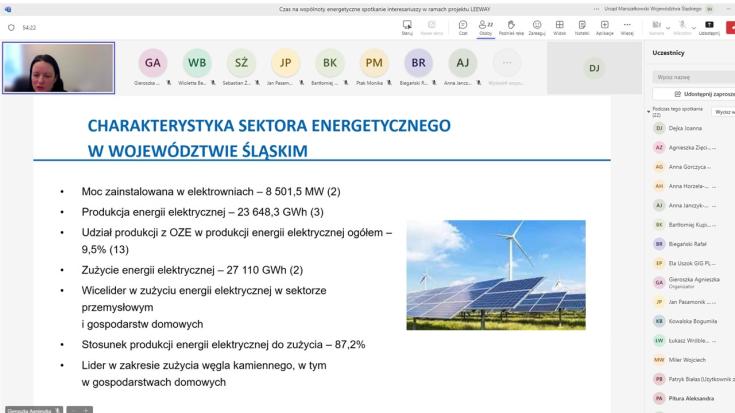First meeting with silesian stakeholders (Poland)

A regional meeting entitled TIME FOR ENERGY COMMUNITIES was held on-line on February 22, 2024, within the framework of the LEading coopEration toWArds energy communities policies tackling energy povertY (LEEWAY) project, which aims to support energy policies for the establishment of Renewable Energy Communities through the exchange of experiences in an international partnership.
During the meeting, formal and legal issues were discussed, barriers and problems were identified, as well as expectations and perspectives in the area of supporting energy policy and creating Renewable Energy Communities.
Monika Ptak, Head of the Regional Innovation Strategy Unit, Regional Development and Transition Department, Marshal’s Office of the Silesian Voivodeship presented the assumptions of the LEEWAY project, objectives and stages of work. She also mentioned the RIPEET project as an interesting initiative that can inspire further work.
Bartlomiej Kupiec, CoopTechHub energy team leader, referred to the EU Directives and national conditions, including the issue of incomplete implementation of regulations on energy communities, which is an obstacle to fully exploiting their potential. He stressed that energy communities are a key element in Poland's energy transition.
Aleksandra Pitura, the Regional Center for Analysis and Strategic Planning Unit, Regional Development and Transition Department, Marshal’s Office of the Silesian Voivodeship, presented the assumptions of the "Low-carbon economy policy for the Silesian Voivodeship, Regional energy policy until 2030", discussed the characteristics of the energy sector in the Silesian Voivodeship and indicated the objectives of activities in the context of strategic documents.
Thanks to the analyses conducted in the Silesian province, so far it has been possible to identify 15 energy clusters, implementing activities in 57 municipalities, and 4 energy cooperatives, in 8 municipalities.
The meeting closed with a short discussion, emphasizing the importance of work on adapting the law to the needs of prosumers. With about 10,000 energy communities operating in the EU, Poland also has a chance to become a full participant in energy communities. Therefore, both legislation and amendment of energy communities' policies, as well as building awareness and encouraging the implementation of particular solutions by local prosumers, i.e. energy clusters, energy cooperatives or civic energy communities are so important to implement new solutions.
